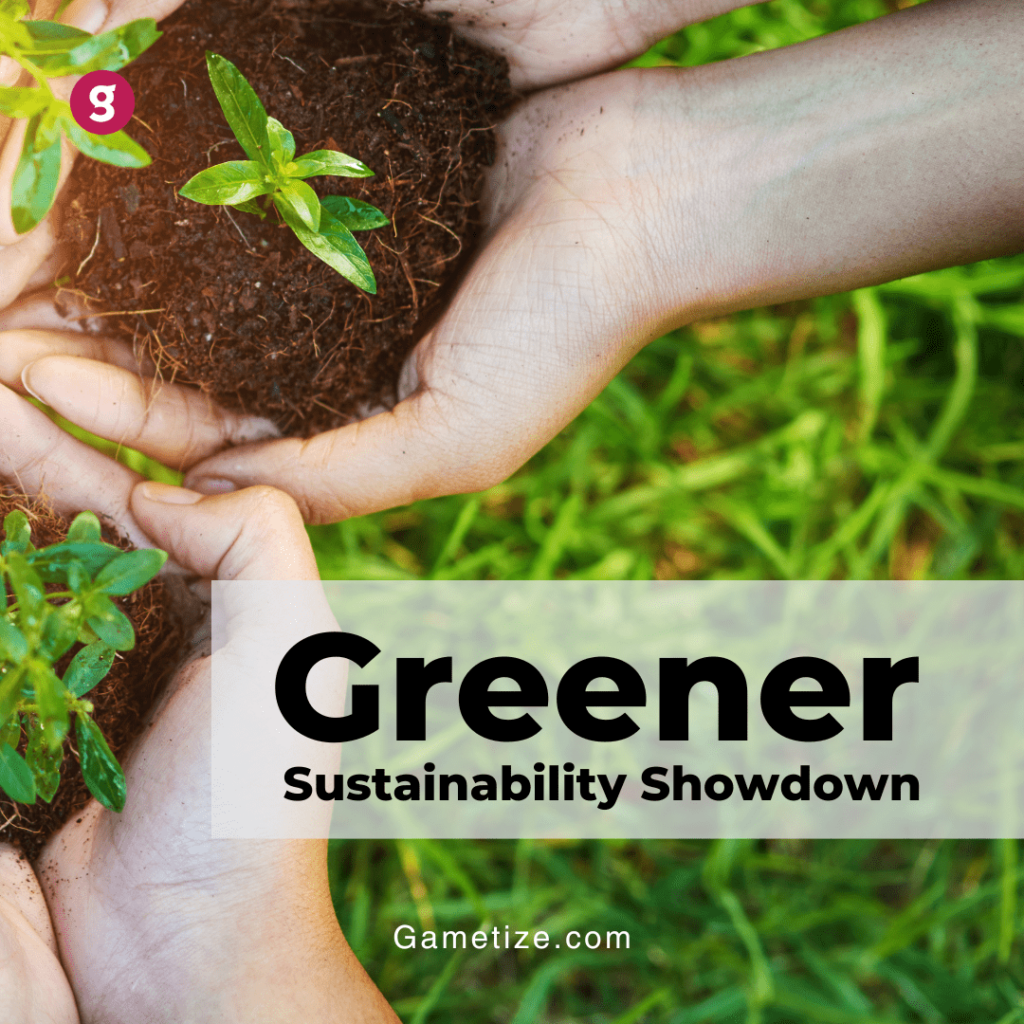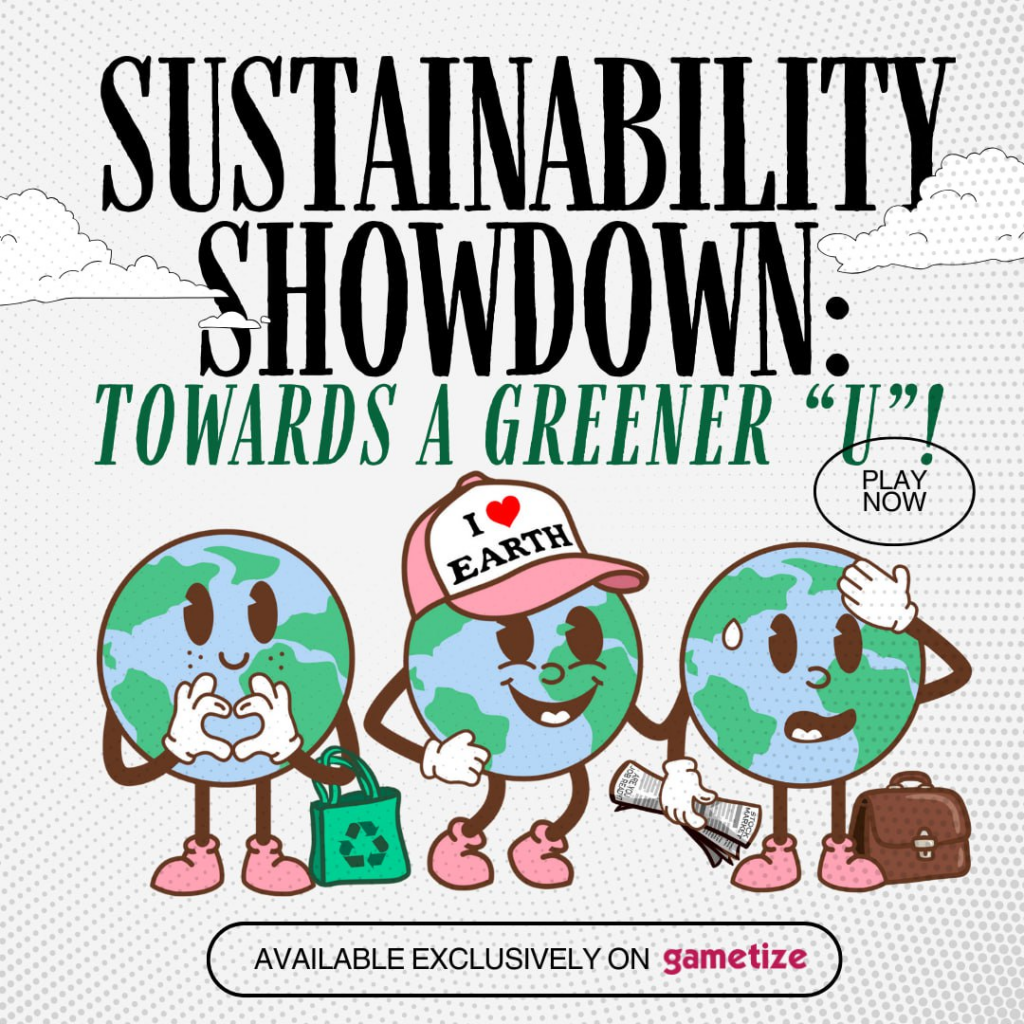1. Leveraging the 6D Playbook and Reflecting on Our Journey
In our quest to address the pressing need for sustainable actions among university students in Singapore, we embarked on a transformative journey driven by the gamification approach. Through meticulous planning, guided by Gametize’s 6D Playbook, and innovative game design, we sought to bridge the gap between interest and action in sustainability among students.
2. Analysing and Enhancing The Gamification Approach using The “6D Playbook”
The 6D Playbook provided a valuable framework for our gamification efforts, enabling us to systematically analyse and enhance our approach.
Define the Problem
Our journey began with a comprehensive survey and online research which enabled us to pinpoint challenges faced by students. This gave us insight on what to focus on, and we eventually decided to target three areas in sustainability: reducing plastic waste, reducing food waste, and increasing recycling efforts.
Determine Goals
We decided to set a realistic and impactful goal of having 1000 students play our game, while aiming for 80% of them to pledge that they will be more sustainable. We would also like 80% of these pledgers to demonstrate sustained commitment, shown when we administer our check-in challenge.
Decide Target Behaviours and Emotions
By focusing on specific player behaviours and emotions, we were able to craft gamified elements that would inspire real-world application. For example, by providing players with relevant storylines and reflection questions on sustainability, we sought to foster a deeper understanding of the issues at hand.
Describe and Profile Players
By segmenting our target audience into distinct player profiles, we were able to tailor our approach to meet the unique needs and motivations of each group. For example, we made each topic in our game shorter so that our busy target groups could still participate in our challenges.
Design Gamification Strategy (Mechanics and Process)
The incorporation of questions, challenges, and a compelling storyline served to emphasise the importance of student involvement in promoting sustainability on campus, exemplified by our mascots. Furthermore, our implementation strategy ensured that our game would reach the widest possible audience and maximise our impact. Looking forward, we hope to expand this reach towards members of staff within universities.
Diagnose and Analyse Content (Limitations)
By critically evaluating our project, we were able to identify areas for improvement in our game. We sought to refine our storytelling approach and little details to ensure the effective use of gamification.
3. Using Gamification to Close The Sustainability Engagement Gap
Our project addresses the discrepancy between interest and action in sustainability among university students in Singapore using gamification. Our game is designed to enhance awareness of sustainable practices through informational resources and reflective questions while the element of competition adds fun and engagement in sustainability. Challenges are released weekly, aiming to instil lasting sustainable habits, and a follow-up check-in question is administered one month after the game’s conclusion to assess the persistence of sustainable behaviours.
4. Learnings & Reflection on Our Project
Our engagement in this project has yielded a wealth of insights into the realm of sustainability, as well as our own and our peers’ perspectives on this critical issue.
Firstly, we realised that while some youths do indeed participate in recycling, there exists a prevalent issue of contamination. This contamination results in the rejection of a large volume of plastic recyclables by recycling companies, meaning that while students may be recycling, they are not doing it correctly. This highlights the need for further education and awareness-raising initiatives aimed at promoting proper recycling practices among the youth.
Secondly, our research revealed that many universities, including our own institution, have established sustainability plans. However, we were unaware of these plans, and upon inquiring with others, we discovered that only a small number of students were cognizant of their existence. This lack of awareness regarding universities’ sustainability goals may indicate a lack of student engagement with sustainability initiatives, which underscores the importance of ensuring that sustainability plans are effectively communicated to the student body.
On a team level, embarking on this project has made us more mindful of our own sustainability practices such as carefully considering what we dispose of in recycling bins, as well as questioning the necessity of single-use items. We believe that these small changes in our own behaviour can have a positive impact on the environment.
In terms of the project itself, we did encounter some challenges. One major difficulty was the inability to reach a formal consensus on our implementation strategy and storyline. Initial discussions yielded a multitude of ideas but failed to produce a definitive course of action. Our group leader’s initiative in formulating a structured plan provided the necessary direction. This experience taught us the importance of effective communication and planning in order to achieve successful outcomes.
Overall, we were able to successfully complete this project due to effective work allocation. We engaged in discussions strategically, primarily to consolidate individual efforts and reassess workload distribution. By leveraging individual strengths, we maximised our collective potential, producing work that reflected our group’s highest calibre.
5. In Summary
Use this template if you are ready to embark on a journey toward a more sustainable lifestyle! If you are yearning to make a positive impact on the environment but are unsure of where to begin, this template is the perfect starting point.
Through its meticulously crafted design, this game will not only provide you with valuable knowledge about sustainability, but also immerse you in an engaging and entertaining experience. As you progress through the game, you will gain insights into various sustainability practices and discover how to implement them in your own life.
With its blend of education and entertainment, this game is the perfect tool for anyone seeking to make meaningful changes toward a more sustainable future. Take the first step toward a greener lifestyle today!
1. Play the game first.
2. Use the Template game for your own initiatives.
Credits: [AY2023/24] G4 Team 3 – Tan Kai Qi, Foo Chuan Leong Freddrick, Jaime Goh Li Shan, Low Zhi Jie Nicholas, Michelle Elizabeth Wong, Ariel Loiter Xiang Ying, Joseph Vino Sukatendel


